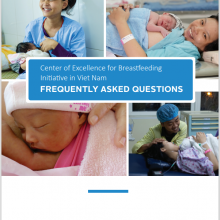Journal article
Aug 22 2021

Implementation of the Code of Marketing of Breast-Milk Substitutes in Vietnam: Marketing Practices by the Industry and Perceptions of Caregivers and Health Workers (Nutrients, 2021)
This study examined implementation of the Code of Marketing of Breast-Milk Substitutes (the Code) in Vietnam with a focus on marketing practices by the baby food industry and perceptions of caregivers, health workers, and policy makers.
Poster/Graphic, Video
Aug 11 2021
Journal article
May 17 2021

Community support model on breastfeeding and complementary feeding practices in remote areas in Vietnam: implementation, cost, and effectiveness (Nguyen, T.T., 2021. International Journal for Equity in Health)
After Alive & Thrive initiated IYCF community support groups in remote villages across nine provinces in Viet Nam, evaluation shows that the group model was effective in reaching remote populations and likely contributed to improved IYCF practices, including higher odds of early initiation of
Guide/Manual
Apr 20 2021

Centers of of Excellence: Frequently Asked Questions
In Viet Nam, Alive & Thrive has worked with a variety of stakeholders to develop “Centers of Excellence for Breastfeeding” — a designation conferred upon hospitals to signify that they are breastfeeding-friendly.
Journal article
Mar 29 2021

Human milk banks in the response to COVID-19: a statement of the regional human milk bank network for Southeast Asia and beyond (Olonan-Jusi, E., 2021. International Breastfeeding Journal)
This statement from the Regional Human Milk Bank Network for Southeast Asia and Beyond examines the insufficient guidance on the use of donor human milk and the role of human milk banks in in clinical management guidelines for COVID-19 pandemic response.
Journal article
Feb 08 2021

Advice to use infant formula and free samples are common in both urban and rural areas in China: A cross-sectional survey (Li, J., 2021. Public Health Nutrition)
Breastmilk substitute (BMS) companies are targeting mothers using aggressive and unethical marketing strategies that violate the WHO Code in both urban and rural areas in China, this study reveals.

